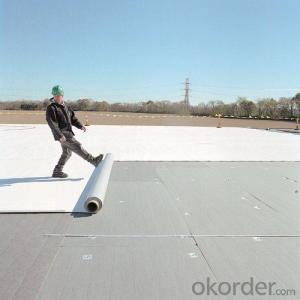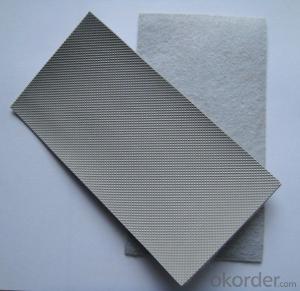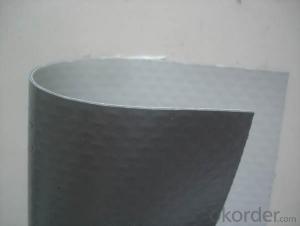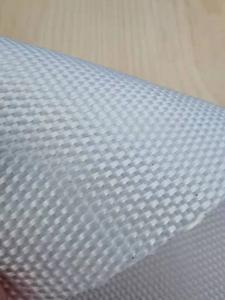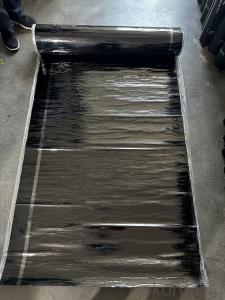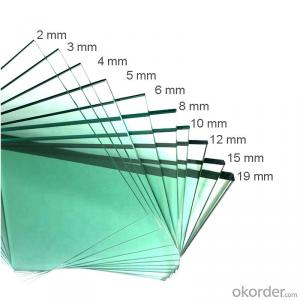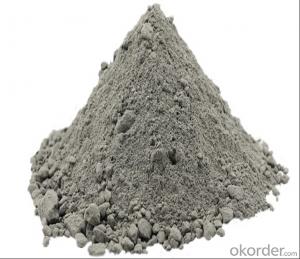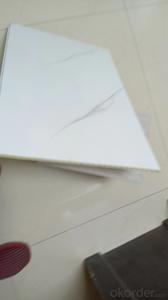PVC Roofing Waterproofing Membrane with UV Resistance
- Loading Port:
- China main port
- Payment Terms:
- TT OR LC
- Min Order Qty:
- 1000 m²
- Supply Capability:
- 50000 m²/month
OKorder Service Pledge
OKorder Financial Service
You Might Also Like
PVC roofing waterproof membrane with UV resistance
PVC membrane can be used for waterproofing on the steel roof, walking roof , planting roof, tunnel, basement, etc.
PVC membrane introduction:
Polyvinyl Chloride (PVC) membrane waterproof membrane is a kind of polymer compound
waterproof membrane compound of polyvinyl chloride colophony, plasticizer, stabilizing agent
,ultraviolet radiation(UV) resistance agent, all kinds of dyes and other agent.
1) Thickness: 0.3mm-2.0mm
2) Color: gray, green, blue
3.) Width: 2.0m
Polyvinyl chloride the pvc waterproofing plastic membrane is a kind of excellent performance of polymer waterproof material,PVC resin as the main raw material,add all kinds of special additive and anti-aging composition,the use of advanced equipment and advanced technology extrusion rolling is made.The product has the tensile strength and elongation high shrinkage of small,low temperature soft good,long life and other advantages, the products wide 1.2m to 3.0m, the thickness of 0.8-2.0 mm(special specifications can be customized),stable performance,reliable quality,construction is convenient.
Application Scope
The products are widely used in all kinds of civil construction,subway,tunnel,water conservancy,landfill site,chemical industry,metallurgy and other areas of waterproof seepage control,corrosion engineering.
Product Category
Single composite PVC waterproof materials
Double composite PVC waterproof board
Seperate PVC waterproof board
Some sticky type PVC waterproof materials
FAQ of PVC Waterproofing Membrane
a.Can we get some samples before place order?
Answer: We can send the free samples to you by freight collect.
b.How many years can your PVC membrane guarantee?
Answer: We will guarantee the quality for 5 years at least.
c.Which countries you ever export the product?
Answer: We export the PVC membrane to South Africa, Middle east and even European countries.
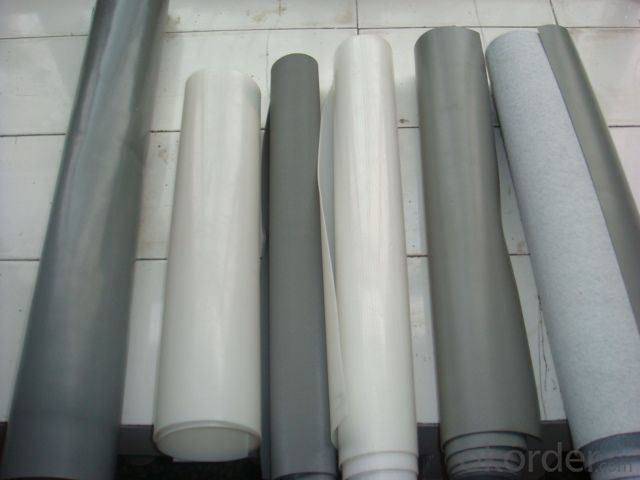
- Q:Can a waterproofing membrane be used for a water tank liner?
- Yes, a waterproofing membrane can be used as a water tank liner. Waterproofing membranes are designed to prevent water from penetrating through surfaces, making them an effective choice for lining water tanks and preventing leaks.
- Q:Can a waterproofing membrane be used in commercial buildings?
- Indeed, it is possible to utilize a waterproofing membrane in commercial establishments. Waterproofing membranes serve the purpose of safeguarding diverse sections of a building, encompassing roofs, foundations, and basements, against water infiltration. In the case of commercial buildings, where the likelihood of water harm is heightened due to larger surface areas, increased foot traffic, and intricate architectural designs, waterproofing membranes prove to be a viable solution. These membranes are specially crafted to establish a protective barrier against water, thereby averting leaks, moisture, and potential structural harm. Furthermore, the integration of waterproofing membranes contributes to the longevity of the building by reducing the risk of deterioration resulting from exposure to water. Consequently, the incorporation of a waterproofing membrane system in commercial establishments aids in maintaining a secure and dry environment, safeguarding valuable assets, and optimizing the lifespan of the structure.
- Q:Is a waterproofing membrane resistant to solvents or chemical spills?
- Yes, a waterproofing membrane is typically resistant to solvents or chemical spills. Waterproofing membranes are designed to provide a protective barrier against water and other liquids, including solvents and chemicals. These membranes are often made of materials such as PVC, TPO, or EPDM, which have excellent resistance to various solvents and chemicals. However, the specific resistance may vary depending on the type and composition of the membrane. It is always recommended to check the manufacturer's specifications and consult with professionals to ensure the membrane's compatibility with specific solvents or chemicals before installation.
- Q:Is a waterproofing membrane resistant to algae or moss growth?
- Yes, a waterproofing membrane is typically resistant to algae or moss growth. The materials used in waterproofing membranes are designed to prevent the growth of organic matter, including algae and moss.
- Q:Are there any specific considerations for installing a waterproofing membrane in high-traffic areas?
- Yes, there are several specific considerations when installing a waterproofing membrane in high-traffic areas. Firstly, the durability and strength of the membrane should be a top priority. High-traffic areas are subject to constant wear and tear from foot traffic, heavy equipment, and other activities. Therefore, the membrane should be able to withstand the load and pressure without getting damaged or compromised. Secondly, the slip resistance of the waterproofing membrane is crucial in high-traffic areas to prevent accidents and ensure safety. The surface of the membrane should provide sufficient grip to minimize the risk of slips and falls, especially in wet conditions. Additionally, the installation process should be carefully planned and executed in high-traffic areas. It is essential to minimize disruptions and inconveniences to the people using the area. This may involve scheduling the installation during off-peak hours or implementing temporary alternative pathways to ensure smooth traffic flow. Furthermore, the choice of materials is important in high-traffic areas. The waterproofing membrane should be resistant to chemicals, oils, and other substances that may be commonly found in such areas. This will help to prolong the lifespan of the membrane and maintain its functionality over time. Lastly, regular maintenance and inspection are crucial for long-term performance in high-traffic areas. The membrane should be regularly checked for any signs of damage or deterioration, and necessary repairs or replacements should be promptly carried out to ensure the continued effectiveness of the waterproofing system. In conclusion, installing a waterproofing membrane in high-traffic areas requires careful consideration of durability, slip resistance, installation process, material choice, and maintenance. By addressing these specific considerations, a waterproofing membrane can effectively protect the underlying structure while accommodating the demands of heavy foot traffic.
- Q:Can a waterproofing membrane be used in schools or educational buildings?
- Certainly, schools and educational buildings can certainly make use of waterproofing membranes. These membranes are specifically engineered to halt water infiltration and safeguard the structural integrity of the building against moisture-related harm. In educational settings, where numerous students and staff congregate, it becomes imperative to uphold a secure and hygienic environment. Waterproofing membranes can be effectively deployed in a variety of areas like basements, roofs, walls, and foundations to avert water seepage, dampness, and the proliferation of mold. By incorporating a waterproofing membrane into their infrastructure, schools can ensure the long-term sustainability of their buildings, safeguard valuable equipment and resources, and furnish a comfortable learning atmosphere for students and staff.
- Q:How long does it take for a waterproofing membrane to dry?
- The drying time for a waterproofing membrane can vary depending on several factors such as the type of membrane, weather conditions, and application method. In general, it can take anywhere from a few hours to several days for a waterproofing membrane to fully dry. It is important to follow the manufacturer's instructions and consider the specific conditions of the project to determine an accurate drying time.
- Q:Can a waterproofing membrane be used on tunnels with water drainage systems?
- Yes, a waterproofing membrane can be used on tunnels with water drainage systems. The membrane acts as a barrier, preventing water from penetrating the tunnel structure and directing it towards the drainage system for proper disposal. This helps to ensure the integrity and longevity of the tunnel while effectively managing water flow.
- Q:Can a waterproofing membrane be used for plaza decks?
- Yes, a waterproofing membrane can be used for plaza decks. Waterproofing membranes are commonly used in construction to prevent water infiltration and protect the underlying structure. Plaza decks are outdoor spaces that require protection against water damage, making waterproofing membranes an ideal solution to ensure the longevity and durability of the deck.
- Q:Can a waterproofing membrane be used in renovation projects?
- Yes, a waterproofing membrane can definitely be used in renovation projects. In fact, it is often a crucial component in ensuring the longevity and durability of the renovated structure. Waterproofing membranes are designed to create a barrier against water infiltration, protecting the building from potential water damage and leaks. During renovation projects, it is common to encounter areas where water resistance is important, such as basements, bathrooms, showers, balconies, and roofs. Applying a waterproofing membrane in these areas can help prevent moisture problems, mold growth, and structural damage caused by water seepage. Furthermore, waterproofing membranes can be used in various types of renovation projects, including residential, commercial, and industrial. Whether it is a small-scale bathroom renovation or a large-scale commercial building refurbishment, utilizing a waterproofing membrane ensures enhanced protection against water-related issues. Moreover, waterproofing membranes come in different forms, such as liquid-applied membranes, sheet membranes, and cementitious coatings. These options provide flexibility in choosing the most suitable membrane for a specific renovation project, considering factors like budget, substrate, and desired level of waterproofing. In summary, a waterproofing membrane is an essential element in renovation projects, as it helps safeguard against water damage and ensures the longevity of the renovated structure. By using a waterproofing membrane, owners can have peace of mind knowing their renovated space is well-protected against potential water-related issues.
1. Manufacturer Overview |
|
|---|---|
| Location | |
| Year Established | |
| Annual Output Value | |
| Main Markets | |
| Company Certifications | |
2. Manufacturer Certificates |
|
|---|---|
| a) Certification Name | |
| Range | |
| Reference | |
| Validity Period | |
3. Manufacturer Capability |
|
|---|---|
| a)Trade Capacity | |
| Nearest Port | |
| Export Percentage | |
| No.of Employees in Trade Department | |
| Language Spoken: | |
| b)Factory Information | |
| Factory Size: | |
| No. of Production Lines | |
| Contract Manufacturing | |
| Product Price Range | |
Send your message to us
PVC Roofing Waterproofing Membrane with UV Resistance
- Loading Port:
- China main port
- Payment Terms:
- TT OR LC
- Min Order Qty:
- 1000 m²
- Supply Capability:
- 50000 m²/month
OKorder Service Pledge
OKorder Financial Service
Similar products
New products
Hot products
Related keywords
